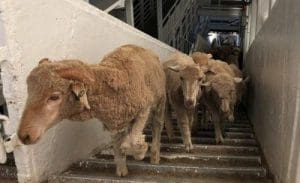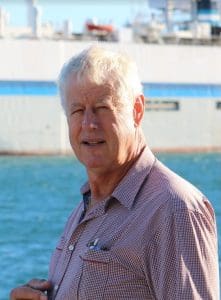DEPARTMENT of Agriculture advice claiming Western Australia’s meat processing sector can “readily absorb” additional sheep numbers if a live export phase out eventuates has been challenged as “total rubbish” by WA sheep industry representatives.

Australian sheep loading onto an export vessel.
Documents released under freedom of information include an internal departmental memo containing talking points for the Federal Government if asked about the potential impact to WA’s sheep industry sheep if live exports cease.
The advice points to analysis from Meat & Livestock Australia predicting international demand for Australian live sheep exports last year was expected to be in the vicinity of around 600,000 head.
The Departmental memo said a combination of surplus production potential in the WA small stock processing industry, along with capital investments that have been made to improve capacity and automation, and the potential for additional shifts “allowed for an additional 500,000-1,350,000 head of processing, if required”.
“Based upon WA’s historical ability to adapt their processing to suit seasonal variability, and the outcome of these recent research and development investments, it is expected that WA could readily absorb the slaughter and processing requirements of those sheep who were destined for the live animal export trade.”
The documents also show the Department told Agriculture Minister Murray Watt in January it would no longer negotiate new sheep export agreements with foreign governments, despite the Federal Government still being months away from initiating a consultation process with industry on its planned sheep export phase out.
Sheep Central has spoken to a range of WA industry stakeholders to gauge their views on the Department’s position in relation to the ability of WA processors to handle an increase in volume should live sheep exports be banned.
One processor who declined to speak on the record agreed with the Department’s analysis, saying the number of sheep exported in the State was small and would easily be absorbed by processors.
Challenge to develop year-round supply
Another (below) pointed to access to year-round supply of suitable stock in future as being a key issue, while sheep producer and live export industry leaders described the Department’s position as overly simplistic and failing to recognise WA sheep production dynamics.
 Of the four meat processing companies with WA operations approached by Sheep Central, only V&V Walsh responded, with general manager Brent Dancer saying future supply, rather than capacity, was likely to be the key issue.
Of the four meat processing companies with WA operations approached by Sheep Central, only V&V Walsh responded, with general manager Brent Dancer saying future supply, rather than capacity, was likely to be the key issue.
“There are concerns about abattoir capacity to absorb the spring flush of lambs with no live export, but an analysis of live export movements shows that even though the summer shipping ban ends in September, shippers don’t get busy until November-December.
“When that occurs, the issue for processors is getting numbers of suitable quality lambs rather than capacity constraints.
“For us, the biggest issue that we need to solve is getting year-round supply of good quality lambs so that we can service our customers week in week out.
“That will require some capital investment to both increase year-round capacity and ensure that processors can maximise the value of the carcase and cuts, and therefore returns to the producers, as well as in marketing in international customer markets.
“Managing resultant effluent from increased production is also an issue that most, if not all, WA abattoirs will require assistance from the WA State Government to facilitate.
“Finally, the industry may require some initial assistance with visas to ensure they have the staff to operate increased throughput levels.”
“Total rubbish”
Sheep producer representative Tony Seabrook from the Pastoralists & Graziers Association of WA described the Department’s position as “total rubbish”.

PGA president Tony Seabrook
The recently reinstated Saudi Arabian market alone was capable of taking more than 1 million sheep a year, he said.
“But whether you can process it or not, the critical question is, at what price?,” he said.
“The difference between undersupply and oversupply is not very much in numbers, but in price it is absolutely huge.
“The absolutely blind bloody ignorance of the politicians in Canberra who have no understanding of running a business actually looks like, to say what they have said, it is just a clear indication of their complete ignorance of how the world works.”
He said talk of the looming ban has created “a general sense of depression and a real malaise” across the WA sheep industry, adding that “nobody could run a sheep operation profitably on current pricing”.
The Albanese Government risked creating a significant animal welfare problem by closing an important trade outlet that allows sheep to be absorbed by the market during peak supply periods.
“The harm that could be done, there is nothing more destructive to the landscape than having more sheep or cattle or anything on your property than you should have,” he said.
“That is ecologically a really bad thing, to put them in a situation where they would rather hang on than sell, and then a late break to the season and over stocking, it flows on through.”
He also criticised Minister Watt for refusing to release the report of independent panel, saying it “ought to be a public document”.
Not a ‘processing vs live export’ debate
Australian Livestock Exporters Association chief executive officer Mark Harvey-Sutton said it appeared the Department had “deliberately misconstrued” industry data from MLA, saying the discussion is not about capacity, but market value.

Australian Livestock Exporters’ Council CEO Mark Harvey-Sutton
“We know that if you take one market opportunity away from WA sheep producers that is going to devalue the production of sheep, and the most likely outcome you will see is less sheep produced in WA.
“I think this whole notion that you can add value to the processing sector, and to the sheep production sector in the west when you remove live export is a complete misnomer.
“That advice the Department is referencing there doesn’t take into account price, seasonality, workforce issues, it simply points to the capacity of the processing sector.”
He emphasised that this was not “a processing versus live export” debate.
“We have no issue with the processing sector, they do an excellent job,” he said.
“But what we’re actually interested in is the market opportunity that exists for producers.
“We know that processing, wool production and live export work in tandem to deliver value to producers in the west.
“And what we’re actually seeing is a policy to shut down a segment or a proportion of that trade or of a market based on activist ideology, it is not based on evidence, it is purely politics.
“And it is the poor old Western Australian producer that is taking it in the neck.”
He also disagreed with recent Australian Government statements that sheep production in Western Australia will transition to a situation where producers will benefit directly from recently ratified Free Trade Agreements with the United Kingdom and India.
“All those agreements are immensely beneficial to producers, but (these statements) demonstrate a complete misunderstanding of how markets actually work, and what products the sheep industry actually produces.
“It is disappointing that I hear this rhetoric being pushed by Labor MPs. What they have done is swallowed the misinformation hook, line and sinker and have not taken the time to actually understand how sheep markets and sheep production works in WA.”
Govt considering industry panel report
In a statement to Sheep Central, a DAFF spokesperson said the Government is considering the independent panel’s report and recommendations.
“The Minister for Agriculture, Fisheries and Forestry, Senator the Hon Murray Watt appointed (in March 2023) an independent panel to consult with stakeholders and provide advice on how and when the government will phase out live sheep exports by sea. The terms of reference asked the panel to consider:
- potential mechanisms to phase out live sheep exports by sea
- a suggested timeframe and options for implementation
- potential ways to support the transition away from live sheep exports by sea, including but not limited to consideration of markets, processing facilities and other opportunities.
“The independent panel provided its report and recommendations to the Minister on 25 October 2023.
“The government is considering the panel’s report and recommendations as well as the next steps for government. This part of normal process and can take some time.”
The statement added that data on the outlook for sheep meat is available via the Australian Bureau of Agricultural and Resource Economics and Sciences (ABARES), agriculture.gov.au/abares/
PGA Welcomes WA Premier’s Support of Live Sheep Trade
Late this afternoon the Pastoralists and Graziers Association (PGA) issued a statement welcoming WA Premier Roger Cook’s comments that Prime Minister Anthony Albanese should reconsider Federal Labor’s plan to ban live sheep exports, saying it is imperative that the Federal Government listen to the Premier of the State that will be adversely affected by the ban.
“This is tremendous support from the Premier, and advice that the Albanese Government should heed,” PGA President Tony Seabrook said.
“The Premier understands the importance of the live sheep trade to WA’s rural economy, and that Western Australian farmers should not have their livelihoods destroyed in order to appease Eastern States based animal rights activists.
“It is time that the Prime Minister step in and reverse his Government’s ill-advised policy before it is too late.”

Generally farmers by nature are resilient & optimistic. We have to be, in order to survive the many challenges that our industry and Mother Nature throws at us. However, as a fifth generation Western Australian livestock producer with a daughter recently returned home to work the farm, I have never been so concerned for the future of our sheep industry and for our farming communities. It is not the weather nor even the fluctuations in markets that are the greatest threats to our futures, but rather the sheer ignorance of a government that gives only lip service to understanding and supporting Australian farmers. Shame on you Minister Watt. By putting party politics before the wellbeing of hard working, dedicated farmers, you have brought such dishonor to the role of federal Agriculture Minister. History will not judge you nor the Labor Party well.
Having over 50 years association with the sheep live export trade, I have noted that each time a boat live export job is announced the price per head of sheep increases. This government’s pandering to minorities for political advantage is a disgrace. Bring on the next federal election.
Peter DeGaris
Just like the El Nino reports that spooked the eastern states. They’ve had 100 to 250 millimetres rain in the last couple of weeks. Where did that come from? This has decimated the WA sheep industry already. The new Kiwi government will start their live cattle job again.